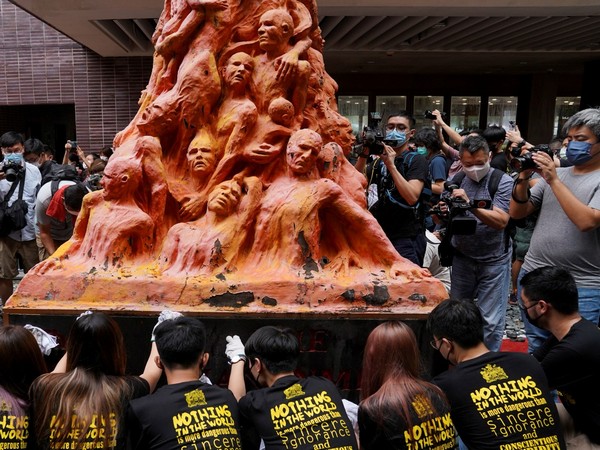The Hong Kong Catholic Social Communications Office, the communications department of the Diocese of Hong Kong, announced on May 24 that there will be no memorial Mass on the Tiananmen massacre’s 33rd anniversary. Several members of the Diocese have expressed concern that holding the Mass in commemoration of the events of 1989 at the Tiananmen Square will be in violation of the draconian ‘National Security Law’. While in mainland China people are not allowed to hold commemorations of the “June 4 incident”; until recently Hong Kong held annual vigils in memory of the victims.
But since Beijing brought in the National Security Law in June 2020, it has tightened its control over Hong Kong and cracked down on dissent including a ban on public commemorations of Tiananmen in 2020, and again in 2021, ‘officially’ because of the COVID-19 pandemic restrictions. Hong Kong will see more state-sponsored Chinese oppression against any event to remember the Tiananmen Square event, which exposes Beijing’s authoritarian and repressive style of governance. Last December, authorities in Hong Kong removed the ‘pillar of shame,’ an iconic memorial dedicated to the Tiananmen Square massacre of 1989.
The memorial designed by Danish sculptor Jens Galschiot symbolised the ruthless killings committed by the Chinese Communist Party (CCP) and the Peoples Liberation Army (PLA) in June 1989 when thousands of students gathered in central Beijing demanding political reforms and democracy. The day is thought to be one of the bloodiest political crackdowns in modern history. Interestingly, a scaled-down replica of the “Pillar of Shame” statue honouring the victims of the Tiananmen Square massacre will be unveiled at a commemorative vigil in Taipei, Taiwan on June 4 evening. Reportedly, Taiwan will be the only place in the Chinese-speaking world to hold such an event to mark the 33rd anniversary of the Tiananmen Square massacre.
Three decades down the line, memories of that massacre still haunt the CCP. PLA ruthlessly killed the Tiananmen Square protesters through a bloody crackdown after CCP imposed ‘martial law’ in June 1989 to forcefully end the months-long protest. Estimates of the death toll vary, but at least 10,000 civilians, mostly students, were killed by the PLA in the crackdown. It was the largest such demonstration in China’s modern history. It shook the CCP to the core, forcing then-leader Deng Xiaoping to tighten the CCP’s grip over the country and purge many party leaders deemed ‘responsible’ for the chaos. In the immediate aftermath of the massacre, the party claimed moral high ground by characterising the protesters as ‘counter-revolutionaries’. Chinese state television reinforced that propaganda by showing images of violence allegedly committed by these ‘counter-revolutionaries’ against the PLA in various parts of the capital.
The party is still concerned about the Tiananmen event’s legacy; unsure whether its propaganda has worked to erase all memories related to the incident. It is also noteworthy that an authoritarian regime like China is far more insecure about its international image and fears democratic protests which may put the CCP’s power in danger. Consequently, even after 33 years of the June 4 event, Beijing continues to hide the true facts from the world and its domestic population. Therefore, it is not surprising that whenever the Tiananmen Square massacre anniversary approaches, the CCP becomes edgy, detains human rights activists, and censors discussions of the crackdown. Moreover, it has also used advanced technologies to erase online mentions of events related to the massacre.
For example, its search engine algorithms crawl politically sensitive search terms on the Chinese internet or redirect the user toward other subjects. In addition, video recognition software can detect images related to the square and its bloody history.6 These developments show the CCP’s uneasiness.7 This contrasts sharply with images just a few months ago when the CCP showcased its centenary and held celebrations touting the success of the party in elevating China to the comity of nations. But for the CCP, the massacre holds a significance of a different kind. After all, it allowed the party to put its house in order, purge the leaders and elevate a new set of leaders.
These reforms paved the way for the rise of the current General Secretary Xi Jinping, who has only set new standards of authoritarianism and repression his predecessors could only imagine. Furthermore, the massacre allowed the CCP to tighten its grip on power. Three decades later after the massacre, the situation in China has remained the same. In fact, the CCP’s heavy-handedness has extended beyond its borders to intimidate, threaten, and cajole those who criticise its human rights record and its repression in Tibet, Xinjiang, and Hong Kong. The CCP remains wary and insecure of any public disturbance or chaos, which could derail its project to rule China indefinitely, just as the events of June 1989 created a sense of instability in the eyes of the top Chinese leadership.

